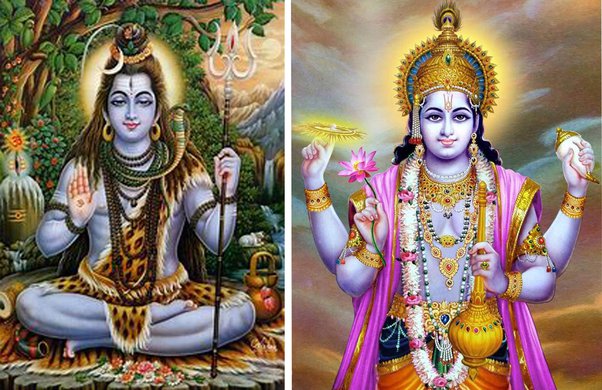Let’s start our discussion first by understanding the term ‘cosmic’. The word “cosmic” comes from the word “cosmos,” which means the universe or everything that exists — all of space, time, energy, matter, and even the spiritual dimensions in some belief systems. If we consider the Hindu belief system spirituality is very much part of the cosmos and the simple reason behind it is that in Hinduism not only physical dimensions but thought, perception and even illusion (Maya) is considered part of the Cosmic world.
Shiva and Vishnu stand as two of the most revered and influential deities within the Hindu religion, though the ultimate goal is same for both the gods but the path taken is very opposite to one another. Shiva represents the inner extreme whereas Vishnu, on the other hand, represents the outer extreme.
First of all we will discuss the spiritual path of lord Shiva.
Shiva: The Path of Inwardness
The essence of Shiva is often captured through the concepts of renunciation, silence, and self-dissolution, representing a profound inward journey towards ultimate truth. The first thing that comes to mind when one talks about the path of spirituality taken up by Shiva is Renunciation. This is also referred as Tyaga or detachment and is the most influential path to attain Moksha when it comes to the Shiva path of spirituality. If we talk about the lord Shiva it is believed that he himself resides in the remote location of Kailash far from the centers of human activity and devoid of material wealth. Silence holds the second most important place in Shiva’s spirituality, this silence attributed to Shiva is not indicative of passivity or a lack of engagement with the cosmos, it indicates the internal connection with the cosmos. The idea here is to mitigate the boundaries between self and the cosmos and this he achieves through meditation and this is the reason most of the time lord Shiva is Shown in Dhyaan Mudra. Here detachment and silence are only the conditions that are required to start the journey in Shiva’s spirituality. We can also say that here the spirituality is based on formless truth or Nirguna Brahma.
Vishnu: The path of active engagement.
Vishnu, in contrast to Shiva’s inward focus, represents a path of active engagement with the cosmos, characterized by his roles as the protector, the upholder of order, and his frequent interactions with the world through his various incarnations. This active involvement stands in contrast to Shiva’s characteristic detachment. In the context of Vaishnavism, “engagement” also refers to the devotional practices that involve actively participating in divine service, performing rituals, and cultivating a deep and loving connection with Vishnu through various forms of worship, Bhakti and keertan is one such divine service where people connect to their god through music and chanting name. The Vishnu spirituality is based on the idea of following and protecting Dharma, it emphasizes that humans must actively involve themselves in the worldly activities based on the rules prescribed in the sacred books. Bhagavad Geeta is the best reflection of the ideas of spirituality related to Vaishnavism.
| Attribute/Role | Lord Shiva | Lord Vishnu |
| Primary Path | Inwardness | Engagement |
| Primary Focus | God is beyond us and outside creation | God is within us and around us. |
| Key Actions/Mode of Being | Meditation & Asceticism | Following and protecting Dharma |
| Eyes | Closed/Half-Closed | Open |
| Primary Symbolism | Formless Truth & Dissolution | Dharma & Cosmic Order |
Shiva and Vishnu may seem very different, but together they help us understand the full nature of God.
Their roles show that the Divine has many sides — both quiet and active, both deep meditation and loving care. This shows how Hinduism gives many ways to connect with God, depending on what each person needs on their spiritual path.
